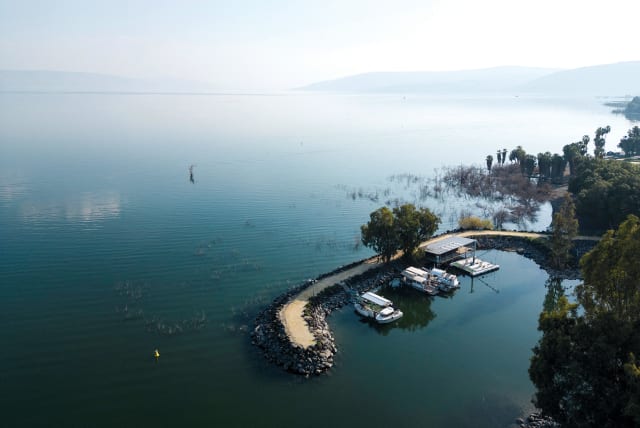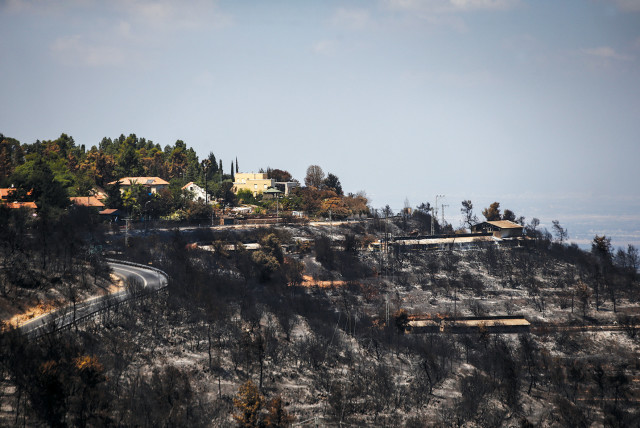Combating climate change and protecting ecology in Israel

Currently set targets are too low, and the watered-down Climate Change Bill of 2023 is a step in the right direction, but there is much more left to do.
The following “reflections” on the current state of affairs relating to climate change mitigation and ecological protection in Israel are intended to stimulate thinking, discussion, and action about a critical situation which possibly constitutes a greater threat to Israel’s future than anything else.
Israel is geographically located in a climate change “hot spot,” where the rate of temperature rise is twice the global average, and the predictions for the future are dire – such as increased temperatures; sea level rises resulting in coastal erosion; and increased levels and intensities of fires and floods.
The result could be multi-sphere negative impacts of great magnitude.
Despite this, the Israeli government has not yet come forth with an all-embracing macro-level plan to fully and sufficiently address current and prospective climate change effects and extreme climate events in Israel. Although it is now focused on the war against Hamas, it needs to urgently confront the climate issue with targets set that fully address the particular challenges and crises facing Israel.
Currently set targets are too low, and the watered-down Climate Change Bill of 2023 is a step in the right direction, but there is much more left to do. Various entities in Israel have produced laudable innovations, but those that are at a micro level will not on their own provide sufficient climate change mitigation effects. As for those that are at a macro level, there is no guarantee at present that they will be adopted in sufficient time and in sufficient quantity to be effective in the necessary time frame.
How is Israel combatting climate change?
The various seawater desalination plants, built and planned, will not on their own adequately address the problems that climate change will pose for Israel. They will certainly provide more water, but this is not enough on its own to combat climate change, and this water will be (if the plants’ power sources remain unchanged, at a substantial fossil fuel carbon emission cost, never mind the other environmental pollution costs (e.g., from the continuous dumping of brine byproduct into the sea).
At present, they have various inherent health, pollution, and other problems and risks which seem to be insufficiently known to, and appreciated by, the general public. These require careful evaluation and solutions.
As regards future desalination plants, some could possibly, more sensibly, be built inland along the courses of the proposed (but not yet implemented) Med-Dead and Red-Dead Sea water canals. These would address multiple problems, such as saving the Dead Sea from drying out using normal seawater and not brine byproduct from a desalination plant. Possibly a combination of solar energy, wave-motion power generation along the proposed Med-Dead and Red-Dead canals (and also along existing water pipes), and gravity drop (i.e., hydro-electricty) could solve the power cost and pollution downsides currently inherent in the existing desalination plants. This is yet to happen.
Apart from the large seawater desalination plants, there are a number of smaller brackish water desalination plants in Israel. It would be a worthwhile exercise to reassess these in light of current thinking and possibilities.
Prime Minister Benjamin Netanyahu has presented proposals for utilizing Elon Musk’s Boring Company to dig underground tunnels between various areas in the West Bank for political reasons. This is a misplaced priority. First choice for large-scale excavation should be the proposed canal projects (Med-Dead and Red-Dead) to mitigate negative climate change effects.
A large earthquake event is reasonably likely to happen in Israel in the foreseeable future. Israel is currently insufficiently prepared for this; so much more needs to be done by way of preparation as soon as is possible.
JNF/KKL predicts an Israeli future characterized by fires and floods of increased intensity and frequency. An objective assessment needs to be carried out forthwith to determine whether adequate systems and services are in place to properly deal with these, at both the national and the local municipality levels. Any found deficits need to be remedied immediately.
The Jordan River and the Dead Sea are drying out, and the rate of this will possibly be exacerbated by climate change. The drying out has long been known, but no constructive amelioration plans have been put into motion at the government level; and the private profit interests of the politically powerful entities exploiting the Dead Sea for its minerals militate against anything effective being done to save the Dead Sea from turning into the Dead Pond.
The proposed seawater canals (Med-Dead and Red-Dead) would provide a refilling of the Dead Sea solution, which would also help with climate change mitigation. The alternative proposed solution of carrying desalinated water (from an existing desalination plant or a new desalination plant in the Galilee) into the Sea of Galilee (the Kinneret) and running excess water from there down into the Dead Sea has, under present circumstances, serious disadvantages.
Might it not be better to run a seawater canal from the Mediterranean into the Jordan River at some point and let this water create hydro-electricty as it drops into, and refills, the Dead Sea? The advantages of this would far outweigh the Jordan River having saltwater in some of its course.
I regard as crucial necessities the two canal systems from the Mediterranean and the Red Sea to the Dead Sea. Only one (from the Red Sea) appeared likely to get off the ground in recent years, but this now seems to have fallen into abeyance. As proposed, this plan had the defect of proposing to dump the brine byproduct from an inland desalination plant into the Dead Sea instead of the better alternative of topping up the Dead Sea with seawater from the canal. This canal would at least have attempted to do something for Israel’s South, which will fare far worse under climate change than the North.
The Sea of Galilee is being topped up, and the water quality of it is supposedly being improved by running desalinated water into it .
It should be questioned whether the claimed benefits of this are worth the negative pollution costs (into the atmosphere and the sea) of the desalination process as is currently being done.
Israel is still seriously under-performing in converting its generation of energy away from fossil fuels toward renewables and cutting down on global warming emissions which, relative to Israel’s population size and geographical area, are relatively high on a worldwide scale. Its own emission reduction targets and commitments to the world have not been met and currently do not seem likely to be met
Its share of renewable energy in electricity generation is one of the lowest in the OECD.
Recently (despite reported opposition from the environment minister), plans have been announced to build two large electricity generation plants that will use natural gas to produce electricity, and also to enlarge an existing gas-using plant. These will negate the positive effects of existing solar energy plants and those planned to be built at Ashalim.
Currently, the interests of the pro-gas lobby seem to predominate over the need to move away from using natural gas, which is a fossil fuel, not a renewable and not clean energy. Exploration for natural gas underwater will be harmful to marine life, and more drilling for gas exploration and production will release enormous quantities of methane gas into the atmosphere.
Israel’s forests (which JNF/KKL claims to be the country’s only current tool to reduce carbon in the atmosphere) take out less CO2 from the atmosphere than Israel produces (only 1% to 3% of total emissions according to one source, with the northern forests absorbing more than the southern forests).
This enormous deficit situation requires simultaneously substantially reducing emissions (not happening fast and aggressively enough) and substantially increasing the amount of carbon-fixing vegetation.
There is claimed to be much thermal heat below Israel’s surface, but this has not been developed into power generation to replace fossil fuels.
Despite plentiful sunshine, solar panels for renewable energy generation exist in insufficient quantities in Israel, and various ministries differ in policy as to where additional solar panel installations should be located. Solar panels compete for limited available land space with agriculture and other land uses, but to date there has only been token development in Israel of the concept of using land for both solar panels and agriculture.
The planned increased usage of electric motor vehicles in Israel in the future will increase the demand for electricity. The question arises as to how this electricity will be produced in Israel – from carbon-free renewables or from carbon-polluting natural gas?
Israel’s vitally necessary forests are always under threat from human beings and nature. How well are they currently protected, how will they be in the future, and how will their overall health be maintained and enhanced?
Past large fires generated some press reportage that Israel was insufficiently organized to combat such fires at the national level.
The belatedly recognized threat of coastal erosion is real and dire. Is this threat being addressed with sufficient attention and energy?
It would be foolhardily shortsighted to let monetary costs – or anything else – deflect attention from the implementation, as soon as possible, of human existence-saving plans and projects in Israel. ■
The writer is a retired chartered accountant and author of texts in the fields of animal rights, ecological protection, and numismatics. Since 2021, he has formulated and promulgated (to influencers worldwide) various plans for climate change mitigation and related infrastructure development in Israel. Contact: anpamm@gmail.com
The Environment and Climate Change portal is produced in cooperation with the Goldman Sonnenfeldt School of Sustainability and Climate Change at Ben-Gurion University of the Negev. The Jerusalem Post maintains all editorial decisions related to the content.
Jerusalem Post Store
`; document.getElementById("linkPremium").innerHTML = cont; var divWithLink = document.getElementById("premium-link"); if (divWithLink !== null && divWithLink !== 'undefined') { divWithLink.style.border = "solid 1px #cb0f3e"; divWithLink.style.textAlign = "center"; divWithLink.style.marginBottom = "15px"; divWithLink.style.marginTop = "15px"; divWithLink.style.width = "100%"; divWithLink.style.backgroundColor = "#122952"; divWithLink.style.color = "#ffffff"; divWithLink.style.lineHeight = "1.5"; } } (function (v, i) { });

